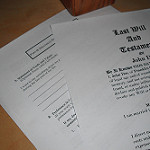“You have cancer.” Scary words. That was 9 years ago and all is well. However, those words have heightened my interest in family medical history. I was intrigued to learn about a government website: https://familyhistory.hhs.gov. What I was surprised to learn, after in putting information, was that there was no way to save it or to print it. While it is useful to see trends, I would have to input all the information again if anything should change (new diagnoses in my living relatives).
I do however, see the value of having a medical history
family tree. Many years ago, as I was
updating addresses for my extended family, I asked about medical information. And as I suspected, very few cousins
responded to my inquiry. Why? The information is personal and many people
don’t want to know if their genes carry a time bomb. I have mixed feelings on
this- one the one hand, I would want to know if my kids had a predisposition to
any disease because of my family history.
On the other hand, if I could not do anything about the situation, then
what good would it do me to know?
There are also several companies that specialize in online
genetic testing. As I see it, the
question is: is the company truly legit and will I get scientific information or
is this just another scheme to get me to part with my money.
Do you have stories to share? Be a contributor. We can learn from one another.
Image: TerraVox










